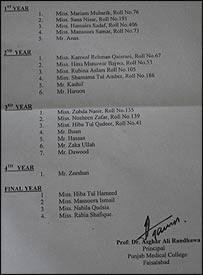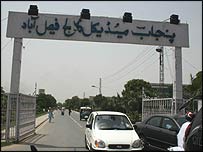Atif Mian
 On Thursday, June 5th, the principal of Punjab Medical College, Faisalabad, expelled every student who belonged to the Ahmadi community from the college.
On Thursday, June 5th, the principal of Punjab Medical College, Faisalabad, expelled every student who belonged to the Ahmadi community from the college.
A total of twenty three students, fifteen female and eight male, across the five years of medical school have been expelled as a result. Further details regarding the incident can also be found in reports from the BBC and from the Daily Times.
The Ahmadi students were “accused” of preaching their religious beliefs. The principal was pressured into expelling the entire Ahmadi student body by a mob of protesters belonging to Islami Jamiat e Talaba. The mob circled the Principal’s office and demanded the expulsions. The same day, a mob of about 300 college students also barged into Ahmadi students’ rooms, beat them and threw their luggage out of their rooms.
 What makes this incident especially troubling is the fact that the decision to expel Ahmadi students was taken by a government-run medical school, under full knowledge of the relevant Punjab ministries.
What makes this incident especially troubling is the fact that the decision to expel Ahmadi students was taken by a government-run medical school, under full knowledge of the relevant Punjab ministries.
![]()
As an academic, and a Pakistani, I am totally appalled by this latest incidence of religious fanaticism. One hopes that the present Punjab government turns a page, and instead of supporting the forces of extremism, comes to the protection of its ordinary citizens.
Atif Mian is Associate Professor of Finance at the University of Chicago, Graduate School of Business.




















































@ mhq
“@ayesha fazal
Your claims are clear lies because,
if
This is for sure that reading does not make any one educated. Jamiat Guys do not even take any guidence from Quran.They are not even close to the teaching of Holy Prophet Muhammad Pease Be Upon Him.
Ordinary citizen,
The second amendment, horrendous as it is, does not “annul” article 20.
Now go back and check again. It is the “definition” of a muslim amendment.
It doesn’t even talk about freedom of religion or abridging it.
Even if it had, which it didn’t, fundamental rights are under jurisprudence immutable sections of the constitution. This is a settled principle of law.
Justathot,
Presidential orders cannot dis-establish fundamental rights. Nor is there anything in the presidential order of 1984 that can serve to clip article 20. Ironically this order opened the door for Non-Muslim Prime Minister…perhaps Zia did not consider the implications of his amendments but for all his Islamization a lacuna in order 1984 has ensured that any citizen of Pakistan can legally become the PM of Pakistan.
But then these things go unnoticed.
Also Bhutto is no idol of mine. And wolper while a great historian has made some awful errors which have been pointed out by other historians. That ofcourse doesn’t take away from his remarkable books on Jinnah and Bhutto.
Let’s not make this discussion about me.
Sridhar,
You are absolutely right about the objectives resolution.
However my reference was to article 20. The OR did not become a substantive part till 1984.
While there are caveats for freedom of expression, article 20 is free of them… it does not mention Islam or anything like that.
I don’t have a high opinion of the basic structure of Pakistan’s constitution but article 20’s freedom of practice and propagation is unfettered and immutable.
“Taken together, a case can be made that the constitution puts restrictions on the propagation of religions other than Islam (or pronounced as being as such, like the Ahmediya example shows).”
@Sridhar: At the time of objective resolution Ahmadis were Muslims, at least constitutionally. But problem is not that but rather the nity gritty when you need to make the difficult decision of which Fiqh of Islam should decide a particular matter of state. In other words, which Islam is the official Islam. Try implementing one fiqh on all and see other fiqh up in arms. Zia ul Haq tried this to some extent by preferring deo-bandi/Jamaat Islami view and since then we have violent confrontations in defence of shia and brelvi sides. In situation like this prize always goes to whoever can show more muscles. Hence the incentive for all religious parties to maintain their armies as well as work with behind the scene forces like army and intelligence.